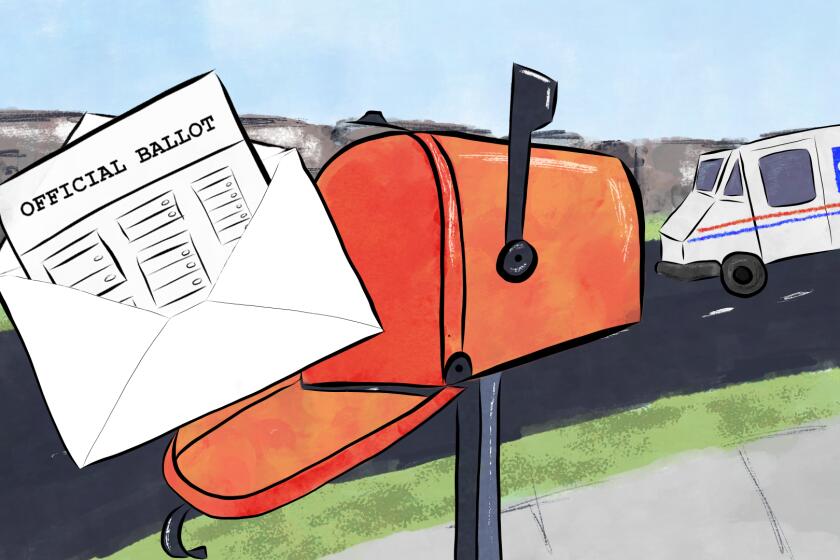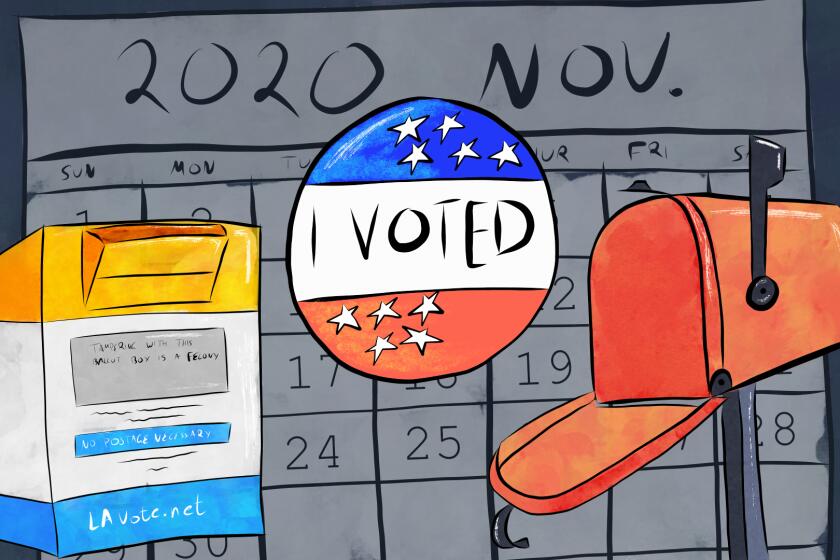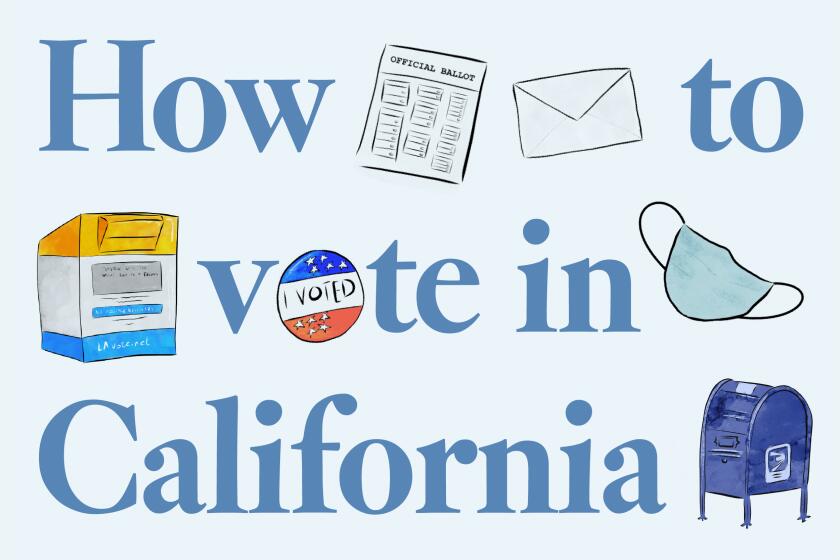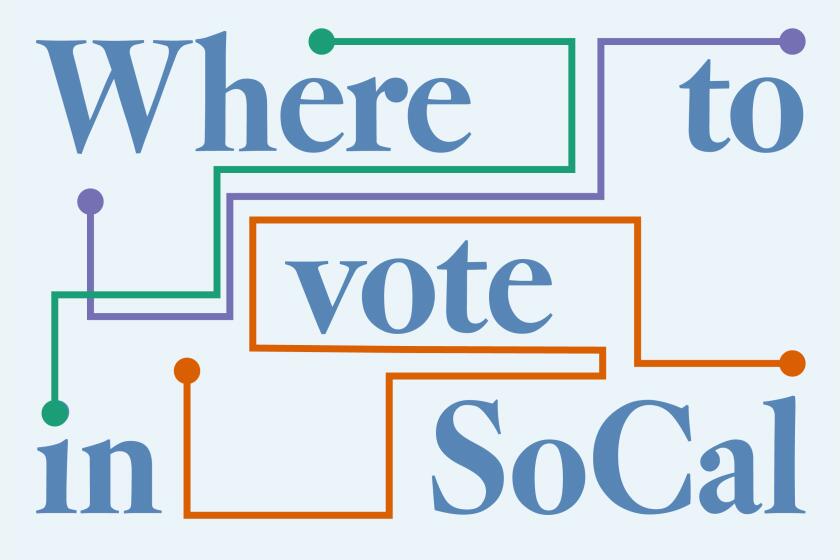In Prop. 22, app-based companies ask voters to resolve what lawmakers would not
- Share via
SACRAMENTO — It was a traditional detour that Uber and Lyft, two companies that reimagined the for-hire transportation industry, chose to take around the roadblock they encountered at the state Capitol. Like others rebuffed by the California Legislature through the years, they decided to go to the voters.
But their effort, funded by a consortium of app-based companies, no longer seems so traditional. In their quest to have voters enact special employment rules for their drivers, the companies have set a new record for ballot measure spending while pushing the boundaries of customary campaign tactics.
“We are confident that California voters and the millions of riders and drivers who use Uber will step up to protect these important work opportunities,” Tony West, Uber’s chief legal officer, said last year when the company announced its intent to file what became Proposition 22.
The proposal asks voters to create a unique designation under state employment law for drivers of app-based companies, allowing them to remain independent contractors but also providing a set level of employment benefits.
“This is what drivers want,” said Geoff Vetter, a spokesman for the Proposition 22 campaign. “The drivers have been very clear for a number of years that they don’t want to be employees.”
Opponents say not all drivers share that sentiment. They have accused the companies of using the employment status of drivers to divert attention away from the effort to maximize profits.
“You didn’t need a ballot initiative to give them more,” Assemblywoman Lorena Gonzalez (D-San Diego) said. “You can just do right by your workers.”
The story behind the ballot measure is one of a political feud — Uber and Lyft clashing with labor unions and Democratic lawmakers — layered on top of a broader struggle to understand the changing nature of work.
In both, no event has been more important than a California Supreme Court ruling in 2018 that imposed a strict test to decide whether self-employed workers should be considered employees. Past state audits found at least a half-million workers in a variety of industries were misclassified as independent contractors, resulting in an estimated loss of $7 billion in state payroll taxes.
An independent contractor, the justices wrote, must be a worker free from control and direction when carrying out tasks; must be someone who conducts duties outside of the usual course of the company’s activities; and must generally perform what the ruling described as “an independently established trade, occupation or business.”
The app-based companies were already sparring with state officials over safety issues, commercial license plates and insurance when the ruling was issued. They have argued that long-standing state regulations fail to account for the complexity of their business model and that they are technology platforms, not transportation providers.
Ray Fuentes, a researcher with the advocacy group Partnership for Working Families, said those arguments are without merit.
“What does common sense tell you?” he said. “When these companies advertise that they’re in transportation, we should hold them to that.”
The court ruling presented a significant challenge to the ride-hailing and delivery companies, whose drivers have always been identified as independent contractors. Their fate seemed to overshadow that of other industries as the Legislature began its effort to codify and expand on the Supreme Court’s action.
Allan Zaremberg, the chief executive officer of the California Chamber of Commerce, said Californians’ reliance on the new technology put lawmakers between a rock and a hard place. App-based companies argued that efforts to impose new rules on their business practices would worsen the customer experience.
“The people made the decision,” said Zaremberg, whose organization supports Proposition 22. “When the public embraces it, it’s hard for the elected officials to come in and take it away.”
The legislative response to the worker classification ruling, Assembly Bill 5, was amended a half-dozen times in 2019 to add additional professions where services could be provided by independent contractors. But no changes were made for app-based companies.
“The problem with their drivers is they squarely are in the column of employees,” said Gonzalez, the author of AB 5. “To somehow exempt them would be dishonest in the law.”
Kurt Oneto, an attorney representing the Proposition 22 campaign, said the decisions made by Democratic lawmakers about what to leave in and out of legislation were arbitrary.
“Even newspaper delivery has less flexibility,” Oneto said, noting a last-minute provision added by lawmakers in 2019 that was endorsed by the ownership of The Times. “So why can they be independent contractors?”
The app-based companies occupy a unique place in California’s political ecosystem, having forged close alliances with tech-focused Democrats in the Bay Area but suspicion from the party’s liberal base and labor unions. Stuck somewhere in between is Gov. Gavin Newsom, who publicly and privately urged the two sides to seek common ground.
A few labor representatives, who often talked of unionizing the industry’s drivers, met with the app-based companies during the spring and summer of 2019. Gonzalez, a former San Diego labor council leader, said the negotiations never produced a comprehensive proposal for lawmakers to consider.
“I think it was a waste of time,” she said. “I don’t know how serious that all was.”
Just before the Legislature adjourned last year, Uber and Lyft announced they were committing $60 million to a ballot measure campaign if there was no action in Sacramento. And when lawmakers failed to budge, the companies launched the campaign for what became Proposition 22.
The ballot measure would require the companies to provide an hourly wage for time spent driving equal to 120% of either a local or statewide minimum wage. It also requires that drivers receive a stipend for purchasing health insurance coverage when driving time averages at least 15 hours a week, a stipend that grows larger if average driving time rises to 25 hours a week.
But work hours only include time spent driving to, picking up and carrying a rider or delivery to a destination, not the time spent waiting in between trips. Vetter said some drivers spend their days accepting assignments from a variety of app-companies and that it’s unclear whether time spent waiting is actually being used to work for someone else.
“It ensures that drivers are paid for the time that they’re actually working,” he said. “It is important to protect the flexibility.”
Voters will be left to decide if those benefits are sufficient.
Proposition 22 critics point out that if the drivers were treated as company employees — which pending lawsuits filed by the state argue should be the case — they would have to be paid for the wait time and offered more generous employee benefits including paid sick leave and workers compensation for on-the-job injuries.
Opponents say other provisions offering new benefits also fail to match up to what employees would be given, including payment of driver-related expenses and background or safety checks.
Being an app-based driver “defies any conception of what it means to be in business for yourself,” said Fuentes, whose group opposes Proposition 22. “This is about basic workplace standards and benefits.”
The ballot measure fight has become a campaign cash juggernaut. Contributions through mid-October on both sides totaled more than $205 million, far surpassing fundraising for any of California’s blockbuster propositions of the last two decades. More than 90% of all the contributions have come from just five app-based companies supporting the measure: Uber, Lyft, DoorDash, , Postmates and the parent company of Instacart.
The companies have vastly outspent their labor union opponents, who have contributed nearly all of the $16 million raised by the campaign against Proposition 22.
Some of the money provided by the companies has sought to boost support among Democrats through the use of slate mailers, one of the oldest forms of political advertising in California. The document is usually a double-sided card offering a variety of ballot recommendations, designed in a way that suggests it represents a list of endorsements by a political organization.
In truth, the mailers are more akin to paid product placements, often organized by political consultants and allowing campaigns to pay for a prime spot.
In the Proposition 22 campaign, Democratic voters raised questions after receiving a mailer labeled as the “Progressive Voter Guide,” which suggests its backers are supporters of Vermont Sen. Bernie Sanders and includes an endorsement of the ballot measure.
Sanders, however, is opposed to the proposition and posted a message on Twitter last week lashing out at the mailer.
“I call on Uber and Lyft to publicly denounce the deception,” he wrote.
Proposition 22 is also opposed by the California Democratic Party and by presidential nominee Joe Biden, whose candidacy is endorsed on some of the slate mailers urging support for the measure.
In the early going, at least, the money spent has failed to rally substantial support for Proposition 22. A poll conducted in September by the UC Berkeley Institute of Governmental Studies found that 39% of likely voters surveyed would side with the companies and vote yes, compared with 36% who were opposed and 25% who were undecided. In order to become law, statewide ballot measures must be approved with a majority vote.
Bob Stern, a co-author of the state’s landmark Political Reform Act, said his studies of California ballot measures show that spending money often doesn’t make much of a difference on controversial measures. He said the “no” side has the greatest advantage, even when being outspent, because confused voters more often choose that option.
“When there’s a lot of money at stake, people are willing to spend a lot of money to either defend their position or get what they want,” Stern said. “But we’ve seen many campaigns where one side has spent a huge amount of money and lost.”
Voters must ultimately decide the importance of the changes in Proposition 22 for the continued operation of app-based companies in California. Critics note the industry’s business practices are facing scrutiny in other states, too, with challenges over employment classification and lack of payments into state unemployment insurance funds.
Supporters of the ballot measure insist that rejection of the proposed law will lead to higher prices for those who take rides or have food delivered. They also warn that the app-based companies could limit their services to California’s cities, abandoning rural areas where taxis and food delivery are otherwise scarce.
The only certainty may be that passage of Proposition 22 would likely settle the issue for the foreseeable future. Provisions of the measure include a ban on employment rules being imposed by local communities. And it would require any change proposed by the Legislature to be approved by seven of every eight legislators, a hurdle far beyond that imposed for either employment laws or tax increases.
Times staff writer Maloy Moore contributed to this report.
More to Read
Sign up for Essential California
The most important California stories and recommendations in your inbox every morning.
You may occasionally receive promotional content from the Los Angeles Times.
















